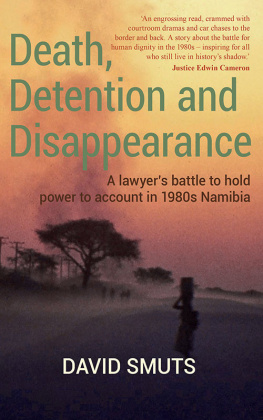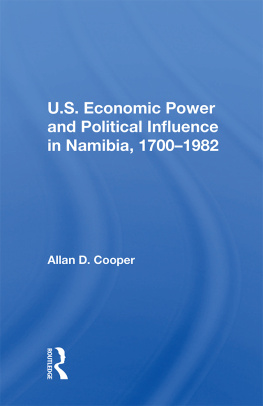David Smuts - Death, Detention and Disappearance: A Lawyers Battle to Hold Power to Account in 1980s Namibia
Here you can read online David Smuts - Death, Detention and Disappearance: A Lawyers Battle to Hold Power to Account in 1980s Namibia full text of the book (entire story) in english for free. Download pdf and epub, get meaning, cover and reviews about this ebook. year: 2019, publisher: Jonathan Ball Publ, genre: Home and family. Description of the work, (preface) as well as reviews are available. Best literature library LitArk.com created for fans of good reading and offers a wide selection of genres:
Romance novel
Science fiction
Adventure
Detective
Science
History
Home and family
Prose
Art
Politics
Computer
Non-fiction
Religion
Business
Children
Humor
Choose a favorite category and find really read worthwhile books. Enjoy immersion in the world of imagination, feel the emotions of the characters or learn something new for yourself, make an fascinating discovery.
- Book:Death, Detention and Disappearance: A Lawyers Battle to Hold Power to Account in 1980s Namibia
- Author:
- Publisher:Jonathan Ball Publ
- Genre:
- Year:2019
- Rating:3 / 5
- Favourites:Add to favourites
- Your mark:
- 60
- 1
- 2
- 3
- 4
- 5
Death, Detention and Disappearance: A Lawyers Battle to Hold Power to Account in 1980s Namibia: summary, description and annotation
We offer to read an annotation, description, summary or preface (depends on what the author of the book "Death, Detention and Disappearance: A Lawyers Battle to Hold Power to Account in 1980s Namibia" wrote himself). If you haven't found the necessary information about the book — write in the comments, we will try to find it.
David Smuts: author's other books
Who wrote Death, Detention and Disappearance: A Lawyers Battle to Hold Power to Account in 1980s Namibia? Find out the surname, the name of the author of the book and a list of all author's works by series.
Death, Detention and Disappearance: A Lawyers Battle to Hold Power to Account in 1980s Namibia — read online for free the complete book (whole text) full work
Below is the text of the book, divided by pages. System saving the place of the last page read, allows you to conveniently read the book "Death, Detention and Disappearance: A Lawyers Battle to Hold Power to Account in 1980s Namibia" online for free, without having to search again every time where you left off. Put a bookmark, and you can go to the page where you finished reading at any time.
Font size:
Interval:
Bookmark:


David Smuts
Death,
detention
and disappearance
A lawyers battle to hold power to account in 1980s Namibia
Tafelberg
To the memory of my parents.
And to the many who courageously resisted.
The struggle of [people] against power is the struggle
of memory against forgetting.
Milan Kundera, The Book of Laughter and Forgetting
Ring the bells that still can ring
Forget your perfect offering.
There is a crack, a crack in everything
Thats how the light gets in.
Leonard Cohen
Anthem, 1992

PROLOGUE
Colonialism came late to Namibia. The countrys rugged coastline, aptly called the Skeleton Coast, is littered with shipwrecks. Stretching inland for some distance from this uninviting shoreline is the worlds oldest desert, the sublime Namib, which gives the country its name. On the eastern side of Namibia lies the vast expanse of the Kalahari Desert, which extends deep into neighbouring Botswana. These two deserts cover much of Namibias territory, making it the most arid country in sub-Saharan Africa. This geography may have discouraged colonial powers until the late nineteenth century. But the discovery of diamonds and other minerals changed that.
Imperial Germany was the first to stake a colonial claim by proclaiming a protectorate around the port of Angra Pequena on the southern coast in 1884 at the behest of a trader, Lderitz. The harbour settlement was later called Lderitzbucht after him. The German colonial area was expanded and the boundaries of German South West Africa became settled after treaties with Portugal in 1886 and Great Britain in 1890.
The land policy of the German colonial period was directed not only at depriving the indigenous population of land for colonial settlement, but also according to leading historian Andr du Pisani at destroying the political autonomous structures of the indigenous people. This was perpetrated by removing people from land and then dumping them on reserves of crown land as an effective way of exercising political and economic control over them. In this way, groups were fragmented and their leadership undermined. This approach was essentially followed and became intensified by the successive South African governments that replaced German colonial rule in 1915.
German policies of land deprivation and other abuses led to uprisings from 1904 to 1907. These were brutally put down, culminating in the infamous proclamation of extermination of the Herero by Governor Von Trotha (the Vernichtungsbefehl) and the genocide that followed. War crimes were also perpetrated against the Nama and Damara communities, which had revolted against German rule in the uprisings of 19041907.
Although German colonial rule is primarily remembered for the genocide and war crimes perpetrated against Namibias people, the legal system imposed on the territory was also oppressive and operated against the indigenous people. German colonial rule did not, however, interfere with land tenure north of the red line. Owamboland was instead to provide a pool of cheap labour. A migrant labour system was introduced which would, subject to refinements and adaptations, remain enforced until the 1970s. A pass law regime was rigidly enforced upon black inhabitants over the age of fourteen from 1907. The Germans passed a law that prevented blacks from owning title to property, or even horses or cattle, without the governors consent. According to Pakenham, those found guilty of stock theft under German law could be (and frequently were) sentenced to death after trials by all-white settler juries.
This was the nature of the legal system inherited by the South African government when it invaded the territory in 1915 following the outbreak of the First World War, marking the end of German rule. The territory was governed under military rule by South Africa until 1920.
The League of Nations was established after the end of the First World War and, under the Treaty of Versailles, the territory became a class C mandate entrusted to South Africa as mandatory power as a sacred trust of civilisation with full powers of administration and legislation over the territory in the best interests of the indigenous population. The South African parliament passed legislation to formalise the mandate in 1919 and military rule formally came to an end with the appointment of an administrator in 1920. German law ceased to apply and Roman-Dutch common law as applied in South Africa became the legal system in the territory, together with statutes enacted for or applied to Namibia.
From the outset of the mandate, South Africas government proceeded to rule the territory as a fifth province of South Africa. The influx of Afrikaners from the Boer republics during German times increased after South Africa took control. Large tracts of land were allocated to these white settlers for farming.
Native reserves continued and were expanded in size after South African rule, especially after the National Party won power in 1948 and implemented its far more rigid racial segregation policy of apartheid in Namibia as well. The native reserves were controlled through selected tribal leaders who acted under the control and supervision of white officials of the South African government. The reserves under German rule were pockets of mostly small pieces of land for the Nama, Damara and Herero people. This system became more formalised and consolidated under South African rule after the Odendaal Commission, which, in 1964 recommended the imposition of its homeland policy of ethnically separated homelands, implemented in 1968. Apartheid by then affected every facet of life in Namibia.
The highly regulated and resented migrant labour system, the lack of access to land (after the initial deprivation) except in reserves without tenure, and massively inferior spending on public services on racial and ethnic lines meant that the profound level of inequality inherited from German colonial times became more entrenched and was further compounded by apartheid policies. The huge inequality in education and other public spending continued right up to independence in 1990, despite the installation of two interim governments with limited powers during the 1980s.
After the end of World War II, the United Nations organisation (UN) was established in 1945 and the League of Nations was formally dissolved the following year. The UN Charter did not, however, deal directly with former mandate territories, although the expectation was that these would form part of the system of trusteeship envisaged in the Charter. South Africa resisted trusteeship, however, and preferred incorporation of the territory into South Africa, a move supported by the all-white legislative assembly established for the territory. Thus began years of dispute over the territory between the UN and South Africa.
The National Party government furthered a policy of incorporation by providing for representation in the South African parliament to white inhabitants of the territory in 1949 and became more and more defiant in its dealings with the UN and the international community after 1948.
As decolonisation elsewhere in Africa and Asia led to new members of the UN adopting a more militant position against South Africa, there was a rise in black political movements and resistance within Namibia. The OPO (Ovamboland Peoples Organisation) was set up in 1958 (as the Ovamboland Peoples Congress), primarily directing its focus upon the detested system of contract labour although also espousing wider nationalist and economic objectives. The South West African National Union (Swanu) was formed in 1959 and was initially closely aligned with the OPO in opposition to the apartheid regimes policies as was Chief Kutakos Herero Chiefs Council. These three organisations headed a defiance campaign against the forced removal of black residents from what was known as the Old Location in Windhoek to Katutura. At least 11 people were killed in the clash between protestors and the South African police on 10 and 11 December 1959. The South West Africa Peoples Organisation (Swapo) was formed in 1959 from the OPO into a national organisation. Both Swapo and Swanu directed petitions to the UN.
Font size:
Interval:
Bookmark:
Similar books «Death, Detention and Disappearance: A Lawyers Battle to Hold Power to Account in 1980s Namibia»
Look at similar books to Death, Detention and Disappearance: A Lawyers Battle to Hold Power to Account in 1980s Namibia. We have selected literature similar in name and meaning in the hope of providing readers with more options to find new, interesting, not yet read works.
Discussion, reviews of the book Death, Detention and Disappearance: A Lawyers Battle to Hold Power to Account in 1980s Namibia and just readers' own opinions. Leave your comments, write what you think about the work, its meaning or the main characters. Specify what exactly you liked and what you didn't like, and why you think so.







